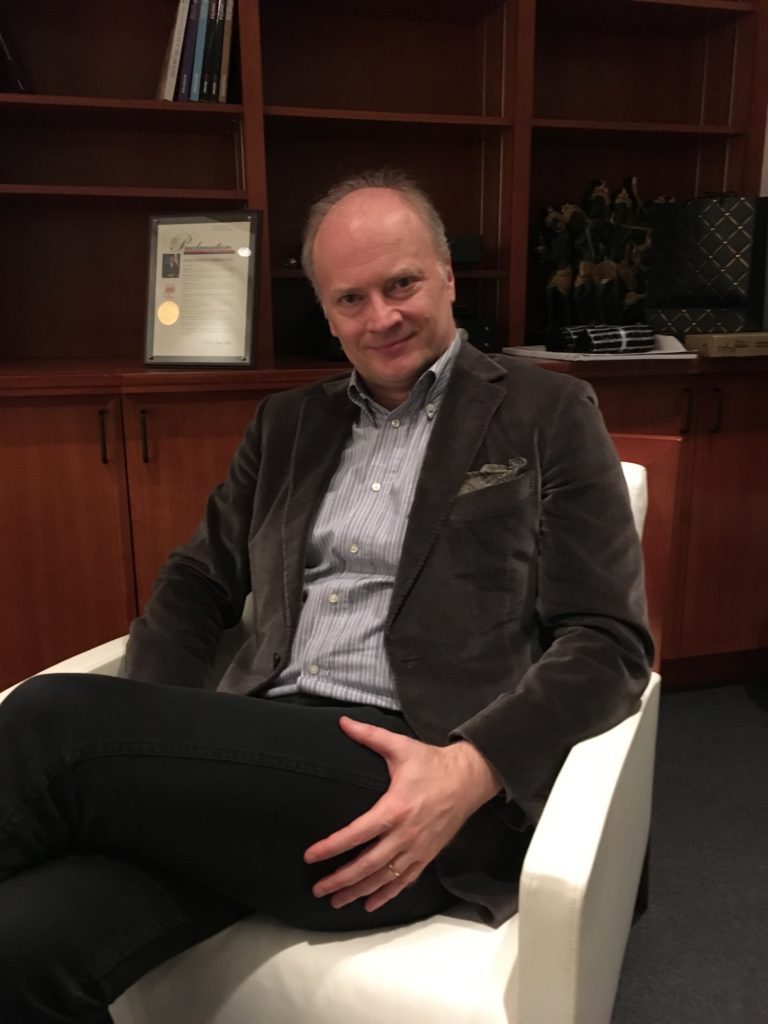A Chat With Maestro Noseda
By • November 21, 2017 0 1188

“I consider the Italianate culture and tradition very valuable things, not only for us, but for the world — the sense of beauty, the sense of style of living,” Gianandrea Noseda told The Georgetowner in an interview last week. Among Italy’s gifts to the world, the National Symphony Orchestra’s new music director numbers opera, espresso and fast cars. “I’m so happy yesterday that Ferrari won the Brazil Grand Prix,” he said.
The next program Noseda will conduct at the Kennedy Center, on Nov. 30, Dec. 1 (an 11:30 a.m. “Coffee Concert”) and Dec. 2, is titled “The Artist Abroad.” High-style pianist Yuja Wang will perform Sergei Prokofiev’s “Piano Concerto No. 5 in G Major,” composed in Paris, with the NSO, which will also play Sergei Rachmaninoff’s “Symphonic Dances” and Benjamin Britten’s “Matinées musicales,” both written in the U.S. The latter is Britten’s orchestration of piano pieces by “Barber of Seville” composer Gioachino Rossini.
“The orchestration is so beautiful, so sparkling,” said Noseda, “so Britten being very Rossini.”
Does the 53-year-old, Milan-born conductor consider himself an “artist abroad”?
“I feel at home in any place,” he said. “Of course, when I go back to Italy, it’s just to recharge the batteries, to find my roots. Because if you know your roots and you are attached to them, you don’t fear anything else. You just accept, you want to learn different things. It’s an endless process.”
One of the most eye-opening and professionally rewarding phases of that process began when Noseda became principal guest conductor of St. Petersburg’s Mariinsky Theatre in 1997, only a handful of years after the Soviet Union’s dissolution — and the reversion of the city known for 67 years as Leningrad to its original name. Though he had performed Russian repertoire before, the 30-something conductor now came face to face with Russian culture under the wing of Mariinsky director (then and still) Valery Gergiev, who he calls “my major mentor.”
“The Russians are incredible narrators. They are fantastic storytellers,” Noseda said, also recalling a bit of the culture shock he experienced during that turbulent time. “I was complaining … the cupolas of the churches [had] a lot of gold. You don’t have even food.” The response was: “Of course, Gianandrea … God from the sky [is] looking down on the earth. When he sees something sparkling, he knows the Russian people is there to pray.”
In brief remarks from the stage and in an “AfterWords” Q&A at the NSO’s Nov. 9 performance, Noseda — who speaks English well (if with an accent and non-native grammar) — expressed a genuine pleasure in his role as musical communicator. This was also evident in his animation when conducting. He seems to have found a balance between cerebral mastery of a score and an openness to varying his interpretation from one performance to the next. Incorporating “elements of surprise” to “catch the attention of the audience” is another thing he learned in Russia, he said.
The Nov. 9 program included Beethoven’s “Eroica” — taken briskly — Anton Webern’s “Passacaglia” and the surprise hit of the evening, Luigi Dallapiccola’s “Partita,” with soprano Corinne Winters. A “big fan” of Dallapiccola and other 20th-century Italian composers he considers unjustly neglected, Noseda said that “the orchestra was mesmerized” by the piece, with a number of the players saying to him: “Just show us more of this music.”
Originally a pianist, Noseda gained notice as a conductor in 1994, when he won an international competition in Cadaqués, Spain — a small Costa Brava resort town frequented by Picasso, Miró and Dalí — and became principal conductor of the Cadaqués Orchestra. In December, after giving concerts in Lisbon, Barcelona, Zaragoza and Madrid, Noseda will serve as chairman of the jury for the 12th Cadaqués Orchestra International Conducting Competition.
The competition finals will take place on Dec. 18 in Barcelona. Three days later, Catalonian elections called by the Spanish government in an effort to neutralize the region’s independence movement will be held. Referring to the ongoing crisis, Noseda said, “In this particular time, I think to try, through the music, to calm down the fire they have,” adding, “I love both [Spain and Catalonia]. They are part of the same humankind.”
In addition to his Washington and Cadaqués posts, Noseda is principal guest conductor of the London Symphony and the Israel Philharmonic and music director of the Teatro Regio opera company in Turin. He has guest-conducted at the Metropolitan Opera since 2002. Of the interplay between orchestral and opera conducting, he remarked: “As a performer, I feed myself with opera and I try to bring the vocal element — even in symphonic repertoire, where the singer is not there — to make the instruments sing. And in the opera, vice-versa. I try to bring the precision of the instrumental music.”
In the first year of a four-year contract as the NSO’s seventh music director (succeeding Christoph Eschenbach, now music director laureate), Noseda has a home in Foggy Bottom. “I love being with students because it gives me the impression, the fake impression, I am still connected to them, which is not true,” he said. “But I can really experience the energy they have.”
He praised the District’s architecture, trees and green space, which create a “more human, friendly atmosphere and environment” than he finds in a skyscraper-filled city like New York. “Even if it’s cloudy, I want to look up and see something.”
One unpleasant surprise about D.C.: “No one is saying good morning or thank you.” However, on a Sunday outing, unshaven and wearing “my fantastic hat,” he was stopped in the street by two people who recognized him from his picture on Metro posters. Given the warm welcome he has received from NSO audiences, there will be more of that, no doubt.

